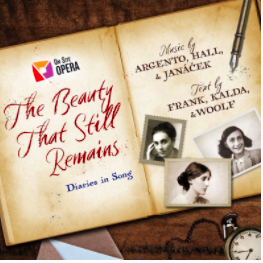Anne Frank’s Diary as a Song Cycle, Part of Beauty That Still Remains
By Sue Weston and Susie Rosenbluth – Two Sues on the Aisle
The pandemic still rages on and theaters are dark, but On-Site Opera, a professional New York City-based company, has found a novel way to keep opera alive and well with a three-part series of radio-style song cycle performances entitled “The Beauty That Still Remains: Diaries in Song.”
Among the diaries that serve as inspiration for the project is Anne Frank: The Diary of a Young Girl. The 24-minute piece, written in 2016 by American composer Juliana Hall, is entitled A World Turned Upside Down. The texts of the seven songs in this piece—“Birthday,” “Hiding,” “Food Cycles,” Footsteps,” “Chains,” “Writer,” and Patch of Blue Sky”—composed for soprano and piano, were taken from Anne Frank’s beloved diary.
Ms. Hall, who said her creative process for song cycles always begins with the text, admitted that she found Anne Frank’s diary one of the most difficult to get through.
“Anne’s situation was particularly dire, yet she maintained a level of positivity,” she said, explaining that she tried to steep the first song, “Birthday,” with Anne’s “inner goodness.” Ms. Hall said she used the tempo to create the sense of childish delight when Anne first received the diary as a birthday gift, using what she called “the syllabic method” to tie the words with the music.
For the song “Food Cycles,” Ms. Hall wrapped her music around the repetition of the words “endive” and “mashed potatoes casserole.” Anne’s lament over her limited diet is immediately followed by the sound of footsteps, representing the looming doom and fear of discovery.
Superb Performances
In On-Site’s production of A World Turned Upside Down, described as “a voice of hope that will not be silenced,” the soprano was Texas native Cristina María Castro, whose comfort with both classical music and musical theater was shown off well. She was accompanied by the superb American pianist and assistant conductor at the Metropolitan Opera, Howard Watkins, who served as the accompanist for all three of the song cycles in On-Site’s series.

The Beauty That Still Remains
The diaries used in the two other song cycles in On-Site’s series were those of Virginia Woolf (music by Dominick Argento) and a fictional work, The Diary of One Who Vanished, by Moravian-Czech composer Leoš Janáček and text by Osef Kalda.
The diary excerpts used for the song cycle based on Ms. Woolf’s work is described as “a brilliant author’s musings, from Creation to imminent death.”
Antisemitism
Although the parts selected from Ms. Woolf’s diary do not reference Jews, many of her antisemitic statements elsewhere have made her controversial in Jewish circles.
A wealthy Englishwoman married to Jewish Leonard Woolf, whom she professed to love, Ms. Woolf often wrote about Jews using offensive stereotypes, calling them “greasy,” physically repulsive, and dirty. Her 1938 short story, “The Duchess and the Jeweller” (originally titled “The Duchess and the Jew”) is considered antisemitic.
Many critics, however, believe her antisemitism was based on the time and place in which she lived and that she was aware of how wrong it was. In a 1930 letter to a friend, she wrote: “How I hated marrying a Jew—how I hated their nasal voices and their oriental jewelry, and their noses and their wattles—what a snob I was: for they have immense vitality, and I think I like that quality best of all.” Although when she was engaged to Mr. Woolf in 1912, she called him “a penniless Jew,” she later wrote, in a scathing denunciation of Christianity, that “my Jew [Leonard Woolf] has more religion in one toenail—more human love in one hair.”
Ms. Woolf, who professed to be an atheist, committed suicide in 1941 at the age of 59. She and her husband had no children, chiefly because he believed she had neither the mental nor physical strength.
The Composer in Love
The Janáček piece scored for a tenor, a mezzo-soprano, and a female ensemble consisting of two sopranos and a mezzo is described as “a young man’s obsession with an ‘untouchable’ woman.” The composer based the work on an anonymous series of poems published in a Czech newspaper in 1917, when he himself had fallen in love. On-Site’s English translation of the piece was by Bernard Keefe.
The cycle’s 22 songs, divided into three parts, tell the story of a peasant boy who meets and falls passionately in love with a gypsy girl.
Completed in 1919, The Diary of One Who Vanished is considered to represent Janáček at his most erotic. It has received several fully staged treatments.
Explaining why he had chosen diaries for the series, On-Site Opera’s general and artistic director, Eric Einhorn, said, “In these times of difficulty and isolation, personal expression through journaling can be an essential and cathartic activity. What can we find in common with those of distant pasts who have sought solace and inspiration in their diaries?”
For more information on how to hear the three-song cycles as well as conversations with the composers and other members of the creative staff, On-Site can be reached at info@osopera.org. “Imagine flipping through the pages of an old diary and hearing the voice of the writer come to life with stirring music,” said Mr. Einhorn.





